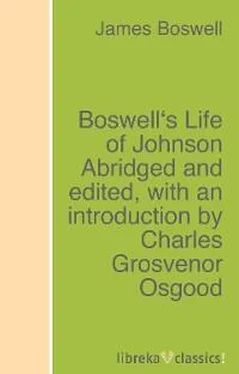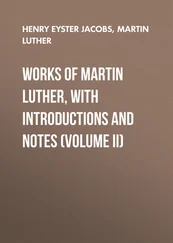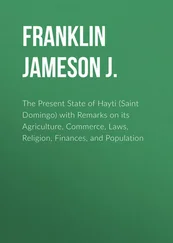James Boswell - Boswell's Life of Johnson Abridged and edited, with an introduction by Charles Grosvenor Osgood
Здесь есть возможность читать онлайн «James Boswell - Boswell's Life of Johnson Abridged and edited, with an introduction by Charles Grosvenor Osgood» — ознакомительный отрывок электронной книги совершенно бесплатно, а после прочтения отрывка купить полную версию. В некоторых случаях можно слушать аудио, скачать через торрент в формате fb2 и присутствует краткое содержание. Жанр: unrecognised, на английском языке. Описание произведения, (предисловие) а так же отзывы посетителей доступны на портале библиотеки ЛибКат.
- Название:Boswell's Life of Johnson Abridged and edited, with an introduction by Charles Grosvenor Osgood
- Автор:
- Жанр:
- Год:неизвестен
- ISBN:нет данных
- Рейтинг книги:4 / 5. Голосов: 1
-
Избранное:Добавить в избранное
- Отзывы:
-
Ваша оценка:
- 80
- 1
- 2
- 3
- 4
- 5
Boswell's Life of Johnson Abridged and edited, with an introduction by Charles Grosvenor Osgood: краткое содержание, описание и аннотация
Предлагаем к чтению аннотацию, описание, краткое содержание или предисловие (зависит от того, что написал сам автор книги «Boswell's Life of Johnson Abridged and edited, with an introduction by Charles Grosvenor Osgood»). Если вы не нашли необходимую информацию о книге — напишите в комментариях, мы постараемся отыскать её.
Boswell's Life of Johnson Abridged and edited, with an introduction by Charles Grosvenor Osgood — читать онлайн ознакомительный отрывок
Ниже представлен текст книги, разбитый по страницам. Система сохранения места последней прочитанной страницы, позволяет с удобством читать онлайн бесплатно книгу «Boswell's Life of Johnson Abridged and edited, with an introduction by Charles Grosvenor Osgood», без необходимости каждый раз заново искать на чём Вы остановились. Поставьте закладку, и сможете в любой момент перейти на страницу, на которой закончили чтение.
Интервал:
Закладка:
He deposited the remains of Mrs. Johnson in the church of Bromley, in Kent, to which he was probably led by the residence of his friend Hawkesworth at that place. The funeral sermon which he composed for her, which was never preached, but having been given to Dr. Taylor, has been published since his death, is a performance of uncommon excellence, and full of rational and pious comfort to such as are depressed by that severe affliction which Johnson felt when he wrote it. When it is considered that it was written in such an agitation of mind, and in the short interval between her death and burial, it cannot be read without wonder.
From Mr. Francis Barber I have had the following authentick and artless account of the situation in which he found him recently after his wife's death:
'He was in great affliction. Mrs. Williams was then living in his house, which was in Gough-square. He was busy with the Dictionary. Mr. Shiels, and some others of the gentlemen who had formerly written for him, used to come about him. He had then little for himself, but frequently sent money to Mr. Shiels when in distress. The friends who visited him at that time, were chiefly Dr. Bathurst, and Mr. Diamond, an apothecary in Cork-street, Burlington-gardens, with whom he and Mrs. Williams generally dined every Sunday. There was a talk of his going to Iceland with him, which would probably have happened had he lived. There were also Mr. Cave, Dr. Hawkesworth, Mr. Ryland, merchant on Tower Hill, Mrs. Masters, the poetess, who lived with Mr. Cave, Mrs. Carter, and sometimes Mrs. Macaulay, also Mrs. Gardiner, wife of a tallow-chandler on Snow-hill, not in the learned way, but a worthy good woman; Mr. (now Sir Joshua) Reynolds; Mr. Millar, Mr. Dodsley, Mr. Bouquet, Mr. Payne of Paternoster-row, booksellers; Mr. Strahan, the printer; the Earl of Orrery, Lord Southwell, Mr. Garrick.'
Many are, no doubt, omitted in this catalogue of his friends, and, in particular, his humble friend Mr. Robert Levet, an obscure practiser in physick amongst the lower people, his fees being sometimes very small sums, sometimes whatever provisions his patients could afford him; but of such extensive practice in that way, that Mrs. Williams has told me, his walk was from Hounsditch to Marybone. It appears from Johnson's diary that their acquaintance commenced about the year 1746; and such was Johnson's predilection for him, and fanciful estimation of his moderate abilities, that I have heard him say he should not be satisfied, though attended by all the College of Physicians, unless he had Mr. Levet with him. Ever since I was acquainted with Dr. Johnson, and many years before, as I have been assured by those who knew him earlier, Mr. Levet had an apartment in his house, or his chambers, and waited upon him every morning, through the whole course of his late and tedious breakfast. He was of a strange grotesque appearance, stiff and formal in his manner, and seldom said a word while any company was present.
The circle of his friends, indeed, at this time was extensive and various, far beyond what has been generally imagined. To trace his acquaintance with each particular person, if it could be done, would be a task, of which the labour would not be repaid by the advantage. But exceptions are to be made; one of which must be a friend so eminent as Sir Joshua Reynolds, who was truly his dulce decus, and with whom he maintained an uninterrupted intimacy to the last hour of his life. When Johnson lived in Castle-street, Cavendish-square, he used frequently to visit two ladies, who lived opposite to him, Miss Cotterells, daughters of Admiral Cotterell. Reynolds used also to visit there, and thus they met. Mr. Reynolds, as I have observed above, had, from the first reading of his Life of Savage, conceived a very high admiration of Johnson's powers of writing. His conversation no less delighted him; and he cultivated his acquaintance with the laudable zeal of one who was ambitious of general improvement. Sir Joshua, indeed, was lucky enough at their very first meeting to make a remark, which was so much above the common-place style of conversation, that Johnson at once perceived that Reynolds had the habit of thinking for himself. The ladies were regretting the death of a friend, to whom they owed great obligations; upon which Reynolds observed, 'You have, however, the comfort of being relieved from a burthen of gratitude.' They were shocked a little at this alleviating suggestion, as too selfish; but Johnson defended it in his clear and forcible manner, and was much pleased with the MIND, the fair view of human nature, which it exhibited, like some of the reflections of Rochefaucault. The consequence was, that he went home with Reynolds, and supped with him.
Sir Joshua told me a pleasant characteristical anecdote of Johnson about the time of their first acquaintance. When they were one evening together at the Miss Cotterells', the then Duchess of Argyle and another lady of high rank came in. Johnson thinking that the Miss Cotterells were too much engrossed by them, and that he and his friend were neglected, as low company of whom they were somewhat ashamed, grew angry; and resolving to shock their supposed pride, by making their great visitors imagine that his friend and he were low indeed, he addressed himself in a loud tone to Mr. Reynolds, saying, 'How much do you think you and I could get in a week, if we were to WORK AS HARD as we could?'—as if they had been common mechanicks.
His acquaintance with Bennet Langton, Esq. of Langton, in Lincolnshire, another much valued friend, commenced soon after the conclusion of his Rambler; which that gentleman, then a youth, had read with so much admiration, that he came to London chiefly with the view of endeavouring to be introduced to its authour. By a fortunate chance he happened to take lodgings in a house where Mr. Levet frequently visited; and having mentioned his wish to his landlady, she introduced him to Mr. Levet, who readily obtained Johnson's permission to bring Mr. Langton to him; as, indeed, Johnson, during the whole course of his life, had no shyness, real or affected, but was easy of access to all who were properly recommended, and even wished to see numbers at his levee, as his morning circle of company might, with strict propriety, be called. Mr. Langton was exceedingly surprised when the sage first appeared. He had not received the smallest intimation of his figure, dress, or manner. From perusing his writings, he fancied he should see a decent, well-drest, in short, remarkably decorous philosopher. Instead of which, down from his bed-chamber, about noon, came, as newly risen, a huge uncouth figure, with a little dark wig which scarcely covered his head, and his clothes hanging loose about him. But his conversation was so rich, so animated, and so forcible, and his religious and political notions so congenial with those in which Langton had been educated, that he conceived for him that veneration and attachment which he ever preserved. Johnson was not the less ready to love Mr. Langton, for his being of a very ancient family; for I have heard him say, with pleasure, 'Langton, Sir, has a grant of free warren from Henry the Second; and Cardinal Stephen Langton, in King John's reign, was of this family.'
Mr. Langton afterwards went to pursue his studies at Trinity College, Oxford, where he formed an acquaintance with his fellow student, Mr. Topham Beauclerk; who, though their opinions and modes of life were so different, that it seemed utterly improbable that they should at all agree, had so ardent a love of literature, so acute an understanding, such elegance of manners, and so well discerned the excellent qualities of Mr. Langton, a gentleman eminent not only for worth and learning, but for an inexhaustible fund of entertaining conversation, that they became intimate friends.
Johnson, soon after this acquaintance began, passed a considerable time at Oxford. He at first thought it strange that Langton should associate so much with one who had the character of being loose, both in his principles and practice; but, by degrees, he himself was fascinated. Mr. Beauclerk's being of the St. Alban's family, and having, in some particulars, a resemblance to Charles the Second, contributed, in Johnson's imagination, to throw a lustre upon his other qualities; and, in a short time, the moral, pious Johnson, and the gay, dissipated Beauclerk, were companions. 'What a coalition! (said Garrick, when he heard of this;) I shall have my old friend to bail out of the Round-house.' But I can bear testimony that it was a very agreeable association. Beauclerk was too polite, and valued learning and wit too much, to offend Johnson by sallies of infidelity or licentiousness; and Johnson delighted in the good qualities of Beauclerk, and hoped to correct the evil. Innumerable were the scenes in which Johnson was amused by these young men. Beauclerk could take more liberty with him, than any body with whom I ever saw him; but, on the other hand, Beauclerk was not spared by his respectable companion, when reproof was proper. Beauclerk had such a propensity to satire, that at one time Johnson said to him, 'You never open your mouth but with intention to give pain; and you have often given me pain, not from the power of what you said, but from seeing your intention.' At another time applying to him, with a slight alteration, a line of Pope, he said,
Читать дальшеИнтервал:
Закладка:
Похожие книги на «Boswell's Life of Johnson Abridged and edited, with an introduction by Charles Grosvenor Osgood»
Представляем Вашему вниманию похожие книги на «Boswell's Life of Johnson Abridged and edited, with an introduction by Charles Grosvenor Osgood» списком для выбора. Мы отобрали схожую по названию и смыслу литературу в надежде предоставить читателям больше вариантов отыскать новые, интересные, ещё непрочитанные произведения.
Обсуждение, отзывы о книге «Boswell's Life of Johnson Abridged and edited, with an introduction by Charles Grosvenor Osgood» и просто собственные мнения читателей. Оставьте ваши комментарии, напишите, что Вы думаете о произведении, его смысле или главных героях. Укажите что конкретно понравилось, а что нет, и почему Вы так считаете.












